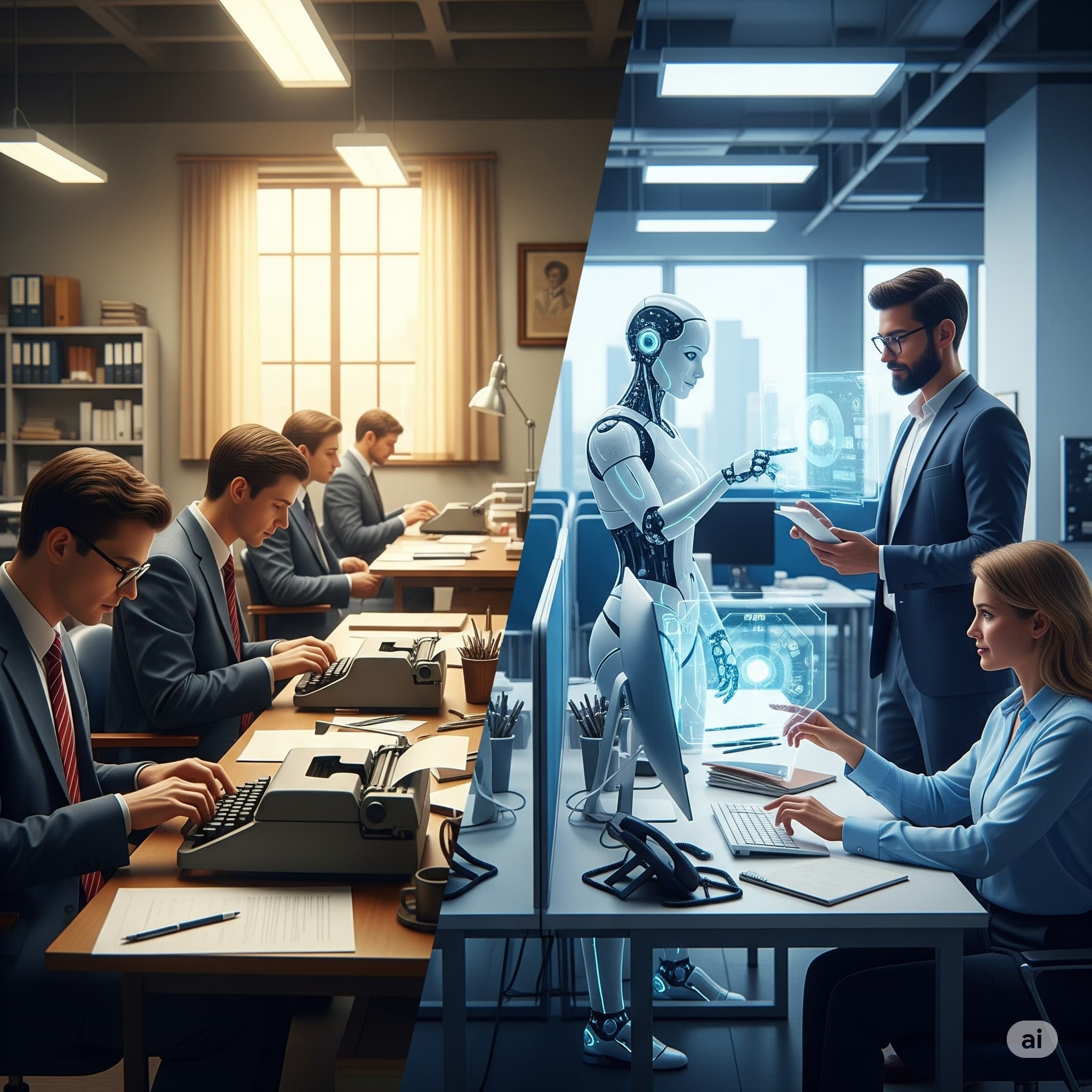Evolution is part of a bigger transformation: Careers in the American Banking Industry are being reshaped by artificial intelligence.
Imagine walking into your local bank branch a decade ago. You’d likely be greeted by a friendly teller, perhaps someone you’ve seen every few weeks, ready to help you deposit a check or withdraw cash. Fast forward to today: that teller might be gone, replaced by a touchscreen or app on your phone. And the person who used to handle those transactions?
They might now be working behind the scenes, analyzing customer data, training AI systems, or managing digital security. It’s not just about robots or automation; it’s about how AI is creating entirely new roles, redefining old ones, and challenging banks and workers to adapt.
In this article, we’ll take a human-centered look at the challenges and opportunities AI brings to careers in U.S. banking. Whether you’re a student thinking about your future, a bank employee wondering about job security, or just curious about where finance is heading, this journey is for you.
Section 1: The Traditional Banking Career Path – A Quick Look Back
Before we explore what AI is changing, let’s remember how banking careers used to look.
For decades, the U.S. banking sector followed a clear structure:
- Entry-level jobs like tellers, clerks, and customer service reps
- Mid-level positions in loan processing, branch management, and financial advising
- Specialized roles in compliance, auditing, risk, and corporate lending
Banking was considered a stable, admired, and clearly tiered profession. Many people spent their entire careers at a single institution.
But then came the digital revolution—online banking, mobile apps, fintech startups, and now, AI.
Section 2: The AI Wave Hits Banking
Artificial Intelligence in banking isn’t science fiction. It’s already here, powering everything from chatbots and fraud detection to credit scoring and portfolio management.
According to McKinsey (2023), nearly 60% of financial services firms in North America have implemented AI in some form, with that number expected to grow significantly.
Major American banks like JPMorgan Chase, Bank of America, and Wells Fargo are investing billions in AI development.
So, what does this mean for careers in the American banking industry?
Section 3: What Wasn’t Working Before? Challenges in the Old Model
- Repetitive Tasks Consumed Time
Many banking roles involved routine work: data entry, document verification, and manual compliance checks. These jobs were time-consuming and leads to human error.
- Limited Career Mobility
Employees often followed linear career paths, with few opportunities to pivot or upskill outside their department.
- Outdated Systems and Training
Banks were slow to adapt their training programs to digital trends. Many workers lacked exposure to tech skills that are now in high demand.
- Customer Expectations Changed Faster Than Banks
The rise of fintech startups offering sleek, user-friendly digital experiences put pressure on traditional banks. Employees weren’t equipped to match those service levels.
Section 4: How AI is Reshaping the Job Landscape
Now comes the exciting part. AI isn’t just eliminating jobs—it’s transforming them. Here are some ways it’s impacting careers across U.S. banks:
- Automation of Routine Work
AI-powered systems now handle:
- Data entry and document processing
- Fraud detection and transaction monitoring
- Customer service via chatbots (e.g., Bank of America’s Erica)
These tools free up human workers to focus on complex, value-added tasks.
- Rise of Hybrid Roles
Many jobs are blending finance with tech. Think:
- Data-savvy financial analysts
- AI model auditors
- Digital product managers in banking apps
According to LinkedIn’s 2024 Future of Work Report, the fastest-growing job categories in finance involve data science, machine learning, and cybersecurity.
- New Roles Created by AI
AI is generating entirely new professions in banking:
- AI Ethicists: ensuring fairness and transparency in algorithms
- Model Risk Managers: monitoring and validating AI outputs
- Human-AI Interaction Designers: creating tools for employees to work with AI effectively
- Upskilling & Lifelong Learning Are Key
Banks are investing in employee retraining. JPMorgan pledged $600 million for upskilling programs by 2025, focusing on tech fluency and digital tools.
Section 5: The Candidate Perspective – What Job Seekers Need to Know
If you’re entering or navigating a banking career today, here’s what AI means for you:
- Technical Fluency is a Bonus (Not Just for IT Roles)
Even roles in customer service, risk, and marketing now benefit from:
- Data literacy
- Basic understanding of AI concepts
- Familiarity with digital tools (CRM, analytics platforms)
- Soft Skills Still Matter
Empathy, critical thinking, ethical judgment, and communication are more important in an AI-enhanced workplace.
- Career Paths Are Less Linear, More Dynamic
You might start in retail banking, move to digital strategy, then shift to risk analytics. That’s not job-hopping; it’s adaptability.
- Certifications and Online Learning Help You Stand Out
Free or affordable courses on Coursera, edX, and LinkedIn Learning can boost your resume in:
- AI & Machine Learning (basics)
- Python for Finance
- Digital Banking
Section 6: The Bank Perspective – Building the Workforce of the Future
From the institution’s side, U.S. banks are rethinking how they attract, retain, and train talent.
- Hiring Strategically for AI Transformation
Banks need not only tech talent but also translators: people who can connect business problems to AI solutions.
- Culture Shift toward Innovation
Traditional banking cultures, known for risk-aversion, must evolve to embrace experimentation and learning.
- Diversity in AI Teams
Inclusive hiring matters more than ever. Diverse teams build fairer AI systems and avoid bias traps in lending and underwriting algorithms.
Section 7: Real People, Real Stories
Meet Carlos, a former teller in Texas who learned SQL and transitioned into a junior data analyst role within his bank. Or Monique, a risk officer in New York now working with AI model validation teams to ensure fairness in automated lending.
These are just two examples of how real careers are evolving in the AI era.
Section 8: Opportunities and Watchouts
Opportunities
- Faster promotions for tech-savvy workers
- Ability to work on meaningful innovation
- Better work-life balance with automation of mundane tasks
Watchouts
- Risk of job displacement without retraining
- Ethical concerns in biased or opaque AI systems
- Need for continuous learning to stay relevant
According to the World Economic Forum (2023), 50% of all banking employees will need reskilling by 2027 due to AI-related shifts.
Section 9: How You Can Prepare for the AI-Infused Future of Banking
Whether you’re already in the banking sector or planning to enter, here are some actionable steps:
- Stay Informed: Read reports from McKinsey, IMF, and World Bank.
- Get Skilled: Learn data tools like Excel, SQL, Tableau, and Python.
- Stay Human: Develop soft skills AI can’t replicate—empathy, creativity, ethical thinking.
- Network: Join fintech meetups, LinkedIn groups, or alumni events.
- Be Curious: Follow banking innovation blogs, listen to AI and finance podcasts.
Conclusion: Reimagining the Future, Not Replacing the Past
AI isn’t the end of banking careers—it’s a reset. Yes, some jobs will vanish, but new ones will emerge. The key is to be ready, adaptable, and willing to learn.
The American banking industry is undergoing one of the most profound shifts in its history. But behind the headlines and tech jargon, it’s still about people—their goals, their growth, and their future.
So, whether you’re considering your first job or your next one, ask yourself: How will I work with AI, not against it?
References
- McKinsey & Company, “The State of AI in Financial Services,” 2023: https://www.mckinsey.com/industries/financial-services/our-insights
- World Economic Forum, “Future of Jobs Report,” 2023: https://www.weforum.org/reports
- LinkedIn Future of Work Report, 2024: https://www.linkedin.com/business/talent/blog
- JPMorgan Chase Careers and Upskilling: https://careers.jpmorgan.com/
- Bank of America on AI & Erica: https://newsroom.bankofamerica.com
- U.S. Department of Labor, Banking Careers Outlook: https://www.bls.gov/ooh/business-and-financial/home.htm






